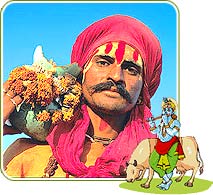Janmashtami Fast
The word for fasting i.e. Upavasa, means to move near to the Supreme and to overcome helplessness. The practice of fasting, could have originated as part of the offering that one could give God for getting a boon fulfilled. The festival of Janmashtami is characterised with keeping fast by devotees.
 Nirjal Fast or Upavasa for Lord Krishna
Nirjal Fast or Upavasa for Lord KrishnaArdent followers of Lord Krishna celebrate Janmashtami by keeping 'Nirjal' fasts. This kind of fasting involves not having even a single drop of water during the entire day. People feel keeping nirjal or waterless fasts will help them get closer to God. Devotees also keep 'Phalahar Vrat' having milk and fruits during the fast. Devotees observe strict discipline while fasting. They refrain from having cereals and salt on the day of the festival . They also feel keeping such fast is the only thing that they can offer God. Fasting is accompanied by singing of devotional songs and mantra chanting.
Popular Dishes made during Janmashtami Fast
Devotees make various dishes during the fast. They have milk and milk products during the fast. This because Lord Krishna was particularly fond of milk and butter. Sweet dishes are also made and had during janmashtami fast. Kheer, Pedhas are popular sweets that devotees have. People do not include salt in their meals during the fast. Devotees fasting on janmashtami break the fast at midnight after the birth of Lord Krishna. They break their fast with Prasad of the Lord.
However with changing times, and even children keeping fasts in the current scenario, the stringent rituals of fasting have been done away with. Sendha namak (salt of a special kind used during fasting) is now allowed during the fast.
Janmashtami Special